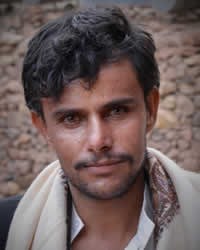Mahra in Yemen

Photo Source:
Rod Waddington - Flickr
Creative Commons
|
Send Joshua Project a map of this people group.
|
| People Name: | Mahra |
| Country: | Yemen |
| 10/40 Window: | Yes |
| Population: | 125,000 |
| World Population: | 282,100 |
| Primary Language: | Mehri |
| Primary Religion: | Islam |
| Christian Adherents: | 0.10 % |
| Evangelicals: | 0.05 % |
| Scripture: | Portions |
| Ministry Resources: | No |
| Jesus Film: | No |
| Audio Recordings: | No |
| People Cluster: | Arab, Arabian |
| Affinity Bloc: | Arab World |
| Progress Level: |
|
Introduction / History
The Mahra tribe has an interesting history regarding the Islamic religion. They were given the protection of the prophet Mohammed. This tribe was instrumental in the Muslim conquest of parts of North Africa, especially Egypt, where the Mahra army set up their headquarters.
Today the Mahra are one of the smaller groups of Arabs in the country, composing a small percentage of the total population. They live in the southwestern corner of Oman near the borders with Saudi Arabia and Yemen, in a region called Dhofar. More specifically, they reside in the northern part of Dhofar in an area called Mahrah, as well as to the east on the Jiddat Plateau. They speak a unique Semitic language called Mahri, or Mehri. The tribe is also called Mehri.
Omani social structure is based on a tribal system of placement. The tribes are classified into levels of nobility based upon genealogy, responsibility and marital freedom. The Mahra are classified as semi-nomadic warriors, which is, by Arab standards a position of low status. The Mahra have a long history of living independently from other peoples. Their independence might be affected by the war in Yemen that is drawing in the entire region, especially Saudi Arabia.
What Are Their Lives Like?
Mahra social structure is based on the tribe. Each tribe is ruled by a sheik, who is considered an expert in Islam and in relating to the outside world. His responsibilities include administering justice, protecting the tribe, sustaining tribal status and providing grazing territory for the herds. They fiercely defend their territory and they try to control goods and people who pass through.
The Mahra are divided into two main groups. The first group, the semi-nomads, can be found on the desert's edge in the far northeastern portion of Oman. During the winter grazing months, they stay out with their animals; and in the dry, summer months they move into the villages. The second group, the settled Mahra, spend the year in small, semi-fortified villages, where they raise camels and goats. Some farming takes place in these villages, and domestic animals are kept for milk and eggs.
Social life is extremely important to the Mahra. They share a daily coffee time while sitting on the floor and planning the next day's activities. Because wood is expensive and somewhat scarce, animal dung is used as fuel for cooking. The typical daily diet consists of wheat bread and porridge, with an occasional addition of boiled meat or chicken.
The Mahra are an endogamous tribe, which means that they only marry within a small social circle. They are also generally monogamous (one wife, one husband). In the past, marriages were arranged by families, but, increasingly, individual choice is becoming acceptable. Children are viewed as the family's greatest asset. They receive inheritances patrilineally (inherited by the next male family member). In this system, boys inherit more than girls. Women are valued for their ability to have children and bond families through marriage.
Despite the teachings of Islam, traditions that uphold different social classes still persist. The manner of dress has become one of the distinguishing factors of class. When boys become men, they change their headgear and begin wearing daggers.
What Are Their Beliefs?
Being Muslims, the Mahra follow the teachings of the prophet Mohammed. They believe that the only way to God is through following the teachings of their holy book, the Koran. Their Muslim religion is a religion of works based on these five "pillars" of faith: (1) A Muslim must affirm that "there is no god but Allah and Mohammed is his prophet." (2) Five times a day he must pray while facing Mecca. (3) He must give an obligatory percentage (very similar to tithes) on an annual basis. (4) He must fast during Ramadan, the ninth month of the Muslim year. (5) He must try to go on a pilgrimage to Mecca at least once in his life.
In addition to their Islamic beliefs, the Mahra believe in jinns and spirits. These must be appeased and treated with care or there can be retribution.
What Are Their Needs?
Though they are self-sufficient as a people, the Mahra are spiritually poor. No one can flourish in their spiritual life without the guidance of Jesus Christ, the only savior. As it stands the Mahra people live in a sea of Sunni Islam. The nearby fighting makes it even less likely for them to hear the gospel.
Prayer Points
Pray for the Lord to make a way for the Mahra people to hear and respond to Jesus Christ.
Pray for the Lord to work miracles that will open Mahra hearts to the King of kings.
Pray for Mahra family leaders to have dreams and visions of Jesus Christ that will open entire clans to his saving grace.
Pray for the Lord to thrust out hearty workers who will live among the Mahra people until there are Christ followers who will disciple others.